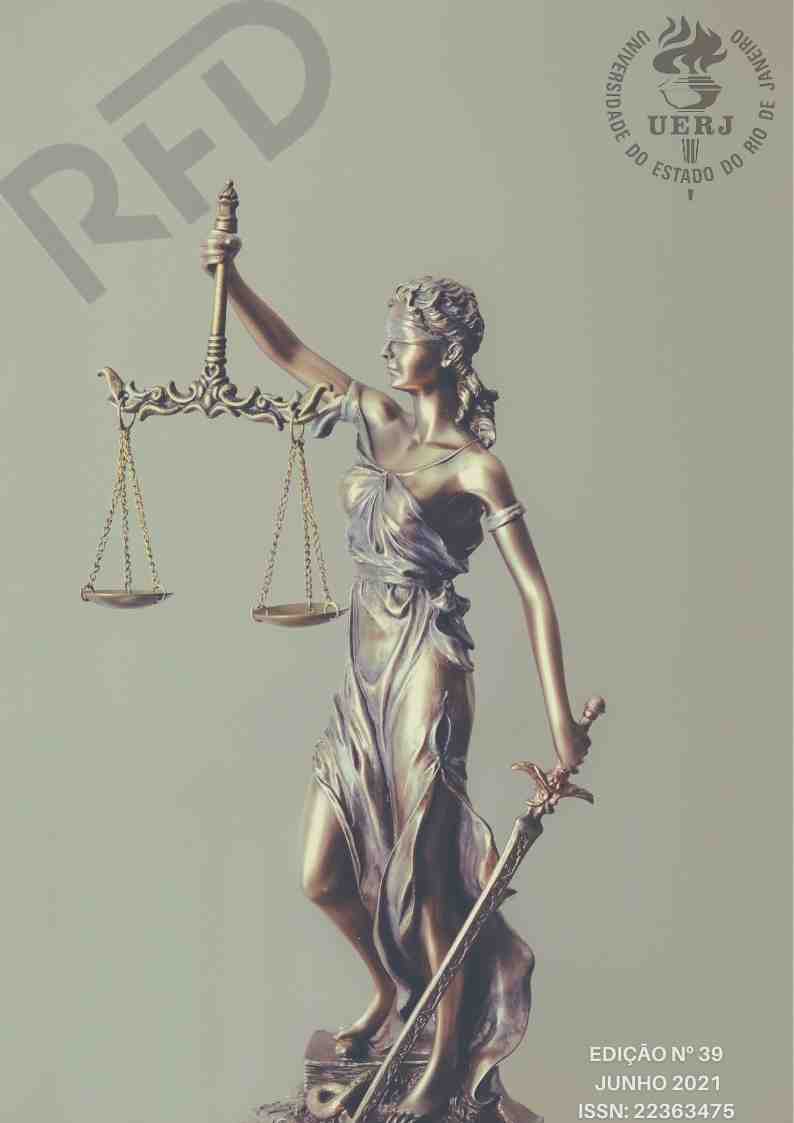RESTITUIÇÃO DO PODER FAMILIAR: POSSIBILIDADE JURÍDICA E BREVES CONSIDERAÇÕES PROCEDIMENTAIS
DOI:
https://doi.org/10.12957/rfd.2021.41926Palavras-chave:
Poder familiar. Restituição do poder familiar. Possibilidade jurídica.Resumo
O presente trabalho tem por escopo tecer considerações acerca da possibilidade da restituição do poder familiar aos genitores destituídos por sentença judicial, a partir da construção de uma revisão bibliográfica narrativa, em que a abordagem apresentada é meramente descritiva e consubstanciada em estudos revisados da literatura, análise do ordenamento jurídico e decisões dos tribunais. Entende-se que, por se tratar de relação jurídica continuativa e, portanto, sujeita à ação do tempo sobre seus integrantes, modificadas as condições objetivas, outra poderá ser a decisão sobre a autoridade parental anteriormente extinta, sem que haja ofensa à coisa julgada. Assim, para que seja possível o restabelecimento do poder familiar, faz-se necessário que os pais faltosos logrem êxito ao provar, em ação autônoma, que, de fato, superaram as condições que os fizeram perdê-lo. Cumpre esclarecer que, conforme previsão expressa do Estatuto da Criança e do Adolescente (ECA), o único instituto definido como irreversível é a adoção, e mesmo a sua definitividade já foi flexibilizada em recente precedente do Superior Tribunal de Justiça (STJ), estabelecendo-se que a base principiológica do ECA tem a possibilidade de retirar a peremptoriedade de qualquer texto legal atinente aos interesses de crianças ou adolescentes, submetendo-o a um crivo objetivo de apreciação judicial. Na sequência, pretensamente estabelecida a viabilidade jurídica do restabelecimento dos vínculos familiares, far-se-ão breves considerações quanto ao seu possível procedimento, permitindo a instrumentalização dessa medida judicial.
Downloads
Publicado
Como Citar
Edição
Seção
Licença
Direitos Autorais
oArtigos publicados na Revista da Faculdade de Direito da UERJ (RFD/UERJ)
Os Direitos autorais dos artigos publicados pertencem à Revista da Faculdade de Direito da UERJ (RFD/UERJ). É permitida a reprodução total ou parcial dos artigos desde que citada a fonte.
oReprodução parcial de outras publicações
Artigos submetidos que contiverem partes de texto extraídas de outras publicações deverão obedecer aos limites especificados para garantir originalidade do trabalho submetido. Plágio em todas as suas formas constitui comportamento antiético e é inaceitável.
Recomenda-se evitar a reprodução de tabelas e ilustrações, extraídas de outras publicações. O artigo que contiver reprodução de uma ou mais tabelas e/ou ilustrações de outras publicações só será encaminhado para análise se vier acompanhado de permissão escrita do detentor do direito autoral do trabalho original para a reprodução especificada na Revista da Faculdade de Direito da UERJ (RFD/UERJ). A permissão deve ser endereçada ao autor do trabalho submetido. Em nenhuma circunstância a Revista da Faculdade de Direito da UERJ (RFD/UERJ) e os autores dos trabalhos publicados nesta revista repassarão direitos assim obtidos.
·Os trabalhos não aceitos para a publicação serão devolvidos aos autores, se solicitado.
A Revista da Faculdade de Direito está licenciada com uma Licença Creative Commons Atribuição 4.0 Internacional.
Este trabalho está licenciado sob uma Licença Creative Commons 4.0, Atribuição-Sem Derivações.
Esta licença permite copiar e redistribuir o material em qualquer suporte ou format para qualquer fim, mesmo que comercial, desde de que citada a autoria original.











